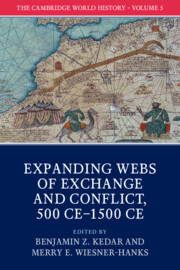Book contents
- The Cambridge World History
- The Cambridge World History
- The Cambridge World History
- Copyright page
- Dedication
- Contents
- Figures
- Maps
- Table
- Contributors
- Preface
- 1 Introduction
- Part I Global developments
- Part II Eurasian commonalities
- Part III Growing interactions
- 9 Trade and commerce across Afro-Eurasia
- 10 European and Mediterranean trade networks
- 11 Trading partners across the Indian Ocean: the making of maritime communities
- 12 Technology and innovation within expanding webs of exchange
- 13 The transmission of science and philosophy
- 14 Pastoral nomadic migrations and conquests
- Part IV Expanding religious systems
- Part V State formations
- Index
- References
13 - The transmission of science and philosophy
from Part III - Growing interactions
Published online by Cambridge University Press: 05 May 2015
- The Cambridge World History
- The Cambridge World History
- The Cambridge World History
- Copyright page
- Dedication
- Contents
- Figures
- Maps
- Table
- Contributors
- Preface
- 1 Introduction
- Part I Global developments
- Part II Eurasian commonalities
- Part III Growing interactions
- 9 Trade and commerce across Afro-Eurasia
- 10 European and Mediterranean trade networks
- 11 Trading partners across the Indian Ocean: the making of maritime communities
- 12 Technology and innovation within expanding webs of exchange
- 13 The transmission of science and philosophy
- 14 Pastoral nomadic migrations and conquests
- Part IV Expanding religious systems
- Part V State formations
- Index
- References
Summary
- Type
- Chapter
- Information
- The Cambridge World History , pp. 339 - 358Publisher: Cambridge University PressPrint publication year: 2015
References
Further reading
- 1
- Cited by

